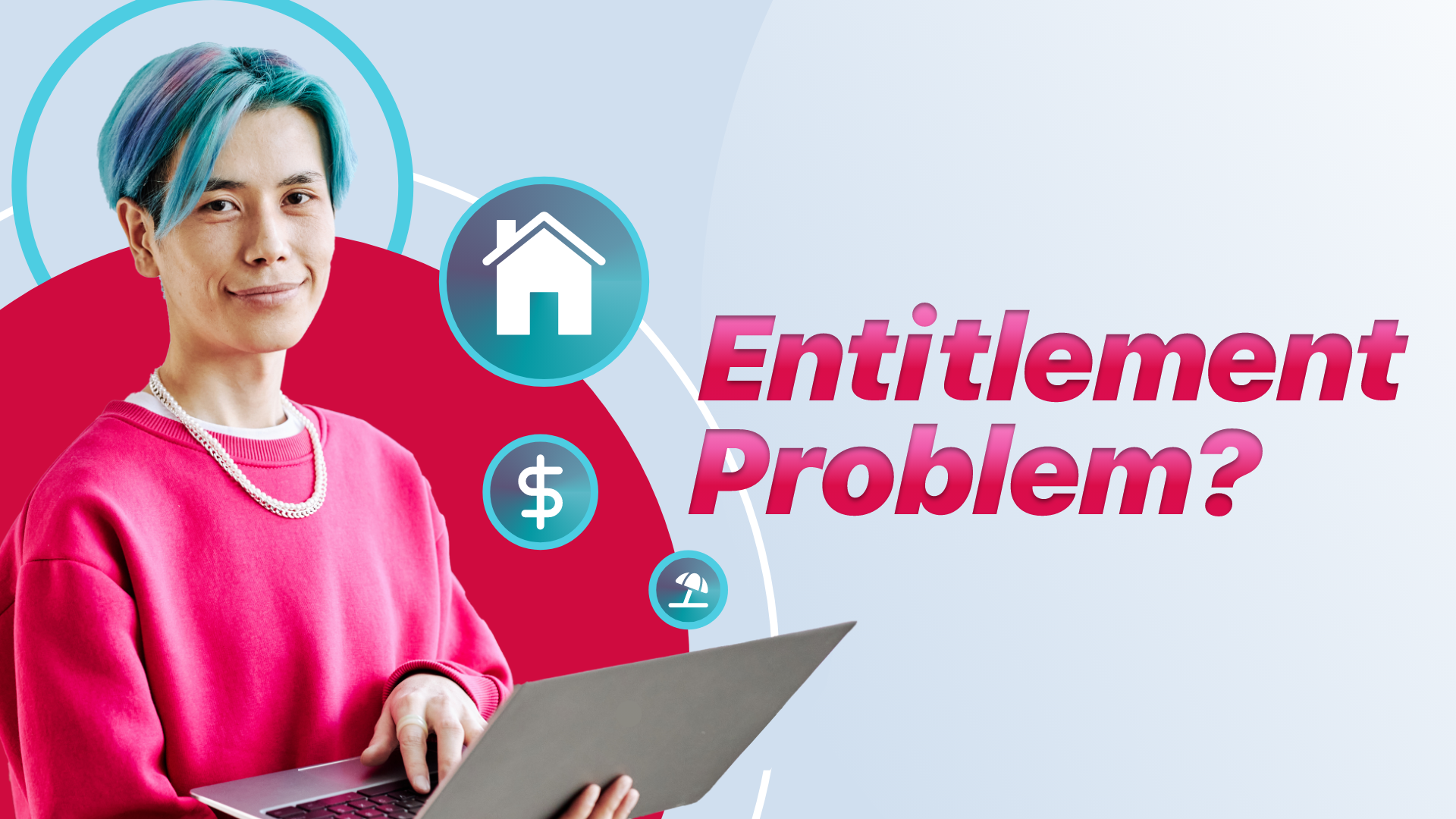
Entitlement Problem?
Older generations think younger generations are entitled.
Let’s face it. Gen Z are more aware of what’s happening in the world because they have access to more information. When previous generations entered the workforce, they literally knew nothing and had to ask for help. This made it easier for HR and management to communicate with and help new employees.
But in the workforce today, Gen Z starts with a good idea of how the world works—from technology and personal branding to social media. So for the first time, a younger generation is bringing a skill set that perhaps older generations don’t have. And so we’ve ended up with a generation of employees with a warped sense of value, otherwise known as entitlement.
The truth is: Gen Z are not more entitled than the next generation. What you perceive as entitlement is just self-confidence. So, if you’re having trouble understanding how to get the most out of your Gen Z workforce, get in line—cause you’re not the only one!

Definition
Gen Z (born between 1997 to 2012) is the largest demographic in the workforce. HR departments must get a grip on managing and dealing with Gen Z and pass that learning on to management because they think differently from previous generations.
They expect work to fulfil their purpose and meet all ideological and political beliefs. We seek purpose because it gives us a sense of importance and a feeling that we are needed. Back in the day, people valued work and derived purpose from it, but it was not the first place people looked. For Gen Z, it is.

Nature of “work”
Decades ago, people got their purpose from the church. And if it wasn’t church, it was the local bowling club. And if you weren’t out and about, you were at home with your family or hanging with neighbours next door because you socialised with neighbours back then.
But as the last century started to close out, church attendance rates dropped. Bowling clubs were put to rest, and the ones that still exist were revamped into bottomless brunch drinking sessions. On top of that, most people don’t have a relationship with their neighbours.
Now, I’m not saying we should go back to the way things were. But work was just a place you went to pay bills. It wasn’t a place you relied on to make friends and fulfil a sense of purpose.
So what does that mean for the workforce that YOU have to manage?
All of the important social and purpose-driven needs now fall on the workplace. As a result, there is enormous pressure on HR to deliver everything all at once.

Gen Z + Work =?
Between the looming threat of war, world leaders down each other's throats, and global warming, things are kinda crazy right now.
Gen Z employees expect work to be a place where they build friendships, find their purpose in life, and have their political and ideological ideals met. On top of that, because of COVID and the induced stress placed on Gen Z in this changing chaotic world, Gen Z are the most depressed generation, clearly don’t cope with stress well and shy away from difficult conversations.
Ultimately, these workplace changes are great. Changing work attitudes are necessary to meet the evolving needs of new generations. This propels society forward. And as a result, Gen Z bring 100% of themselves to work. And because HR is there to manage the workforce and these changing habits, what do you do?
You need to help Gen Z have better conversations. Help them deal with other humans better. And the great news is, no one knows people better than you!
Here are some ways to help Gen Z deal with other people better and some tips on broaching conversations with this generation, which could be different from how you approached previous generations.

Dealing with confrontation
As you’ve probably experienced first-hand, Gen Z employees aren’t great with confrontation. They avoid it entirely. They would rather quit than ask for a raise. Or worse, ghost someone rather than break up with them. If you don’t know what ‘ghosting’ is, ask someone under 21!
Facing confrontation is part of being human. In the workplace, it’s caused by another employee creating tension. There are many ways to deal with it, but Gen Z choose the avoidance option. In your next meeting, explain that avoidance is often a bad choice because the problem gets bigger and worse, leads to more tension and broken relationships.
You should encourage them to lean into confrontation and embrace tension. It’s HR’s job to ensure employees are comfortable with confrontation and learn how to safely and securely embrace uncomfortable conversations.
Show them how it’s done. Start by giving them a heads-up that you’re about to have an uncomfortable conversation. By asking permission, you ensure they’re in the right mindset to chat; if not, prepare them for it. Let them know what’s about to happen, and let them take a deep breath and prepare to lean into tension. It also lowers their defence and opens them up to talking.
The employee might ask to have the conversation at a later time or date, and that’s fine because you’ve either given the employee notice or asked permission to have a difficult conversation.

Giving and receiving feedback
Giving feedback is not just about conveying your point, it’s about creating an environment where the employee is more likely to listen and take the feedback on. Because there’s a difference between giving a person feedback and giving a person feedback they’ve heard.
You must explain the reason you’re giving feedback. It’s not to criticise but to help the person grow. Because it’s important you build a culture where feedback is welcomed or at least understood.
Start by thinking about how you give the feedback. We usually pull out a piece of paper, point to what’s wrong and talk about what we want changed. As we know, we need to build empathy with Gen Z employees.
So instead, start on a more human level and let them know you want to talk about X so Y doesn’t become a future problem. Let them know you care about their growth and success in the company. Introduce the behaviour as talking points and things that might have gone a little sideways and that you want to discuss ways to solve them.

